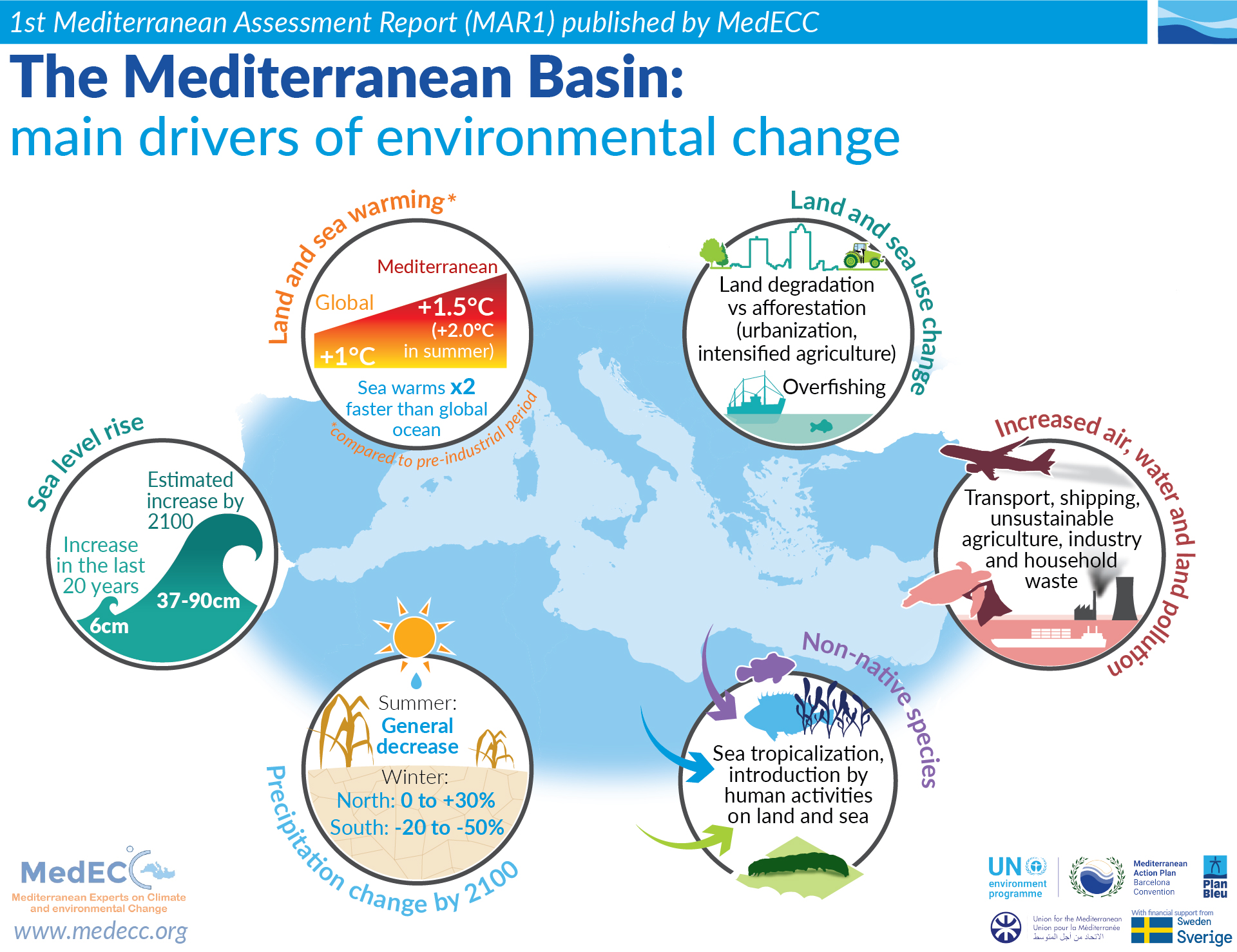MedECC Press Release | Marseille, 25 September 2023 — Extreme floods kill several thousands in Libya, indicating the lack of action on climate change mitigation and adaptation
The chain of events
The storm Daniel hit Greece from September 4 to 6, 2023. The torrential rains it caused were among the most extreme in terms of amount of precipitation—the city of Volos received about 450mm, 90% of its annual average. The storm killed at least 15 people in Türkiye, Greece and Bulgaria and inundated more than 75,000 hectares of land. This storm came after a very dry and hot summer marked by dozens of fires that have destroyed over 150,000 hectares of land and had already killed 25 people. On these dry lands run-off was fast and flood intensity increased. These events in combination were exacerbated by anthropogenic climate change and indicate future conditions under further global warming.
Very few days later, September 10-11, the same storm continued its way through the East Mediterranean Sea. Its power was reinforced by the very warm sea surface temperature (above 27°C), loading its air masses with additional moisture. The World Meteorological Organization (WMO) has classified it as a rarely occurring hurricane-type event, called a medicane. Making landfall on the Eastern Libyan coast, Daniel poured huge amounts of rainfall over Libya (with a hourly rainfall rate up to 414 mm recorded in a city close to Derna). This intensification of storms, occasionally developing into medicanes, is fully coherent with the scientists’ projections of global warming in this region.
An unprecedented disaster for Libya
The floods led to the collapse of two 50-year-old dams, which rushed water towards Derna, resulting in at least several thousands of deaths and over ten thousand missing, the far deadliest flood in Africa since 1900, according to CNN. For Greece and parts of Bulgaria and Türkiye, World Weather Attribution finds that human-induced climate change made an event as extreme as the one observed up to 10 times more likely and up to 40% more intense compared to a 1.2C cooler climate. For Libya, the probability is multiplied by 50 and the intensity is up to 50% more large. Similar to the physical features of climate change, such kind of losses were expected by numerous scientific studies of impacts and adaptation, and they are increasingly likely to occur again elsewhere in the future, notably in regions affected by political instability and poverty. Libya endures one of the deadliest consequences of failing international climate policies and inadequate preparedness for such extreme events.
The analysis of MedECC
The expert group on environmental and climatic change in the Mediterranean basin (MedECC) has been alerting since 2018 on this cocktail of risks for this region exacerbated by global warming. Current work focuses on the particularly severe risks of climate change in the coastal zone, and on the linkage between political and economic instability and the consequences of climate change, including human displacement and migration.
The intolerable loss of life and the massive human suffering caused by this event could have been significantly less if international commitments to climate action, repeated during 27 Conferences of the Parties to the United Nations Framework Convention on Climate Change, had been followed up with sufficient measures by the world’s governments. MedECC now renews its calls on effective and durable reductions of greenhouse gas emissions as well as on much stronger, fair and equitable support for adaptation policies.

###
Note to Editors:
For all inquiries about MedECC, please contact Kasia Marini, Lead Science Officer of MedECC
(marini [@] medecc [dot] org). Interview requests with MedECC experts should be addressed to MedECC Secretariat (contact [@] medecc [dot] org) but can also be made by e-mail to MedECC Coordinators: Wolfgang Cramer (wolfgang.cramer [@] imbe [dot] fr), Fatima Driouech (driouechfatima [@] yahoo [dot] fr), Joël Guiot (guiot [@] cerege [dot] fr).
About MedECC: The Mediterranean Experts on Climate and environmental Change (MedECC) is an open and independent network of scientists founded in 2015. MedECC produces assessments of scientific knowledge on climate and environmental changes and associated risks, taking also into account social aspects (such as migration) in the Mediterranean region targeting decision-makers, stakeholders and citizens. The MedECC published the First Mediterranean Assessment Report (MAR1) in November 2020. The report contains a Summary for Policymakers (SPM) which is available in 9 languages and has been approved line by line during a plenary session with Mediterranean government representatives in September 2020.
Follow MedECC on Linkedin
